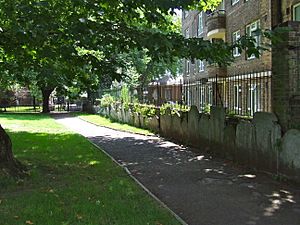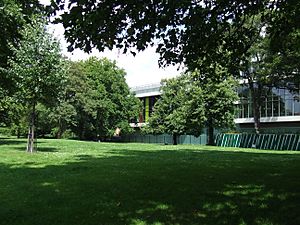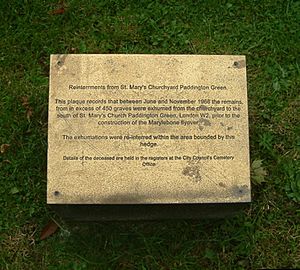St Mary on Paddington Green Church facts for kids
Quick facts for kids St Mary on Paddington Green |
|
|---|---|
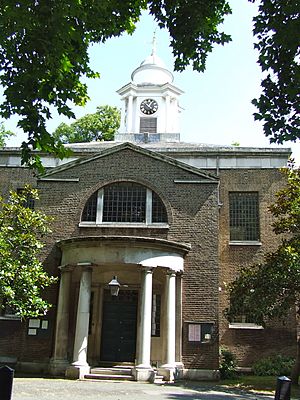 |
|
| 51°31′13″N 0°10′31″W / 51.5204°N 0.1753°W | |
| Location | Little Venice, London, W2 1NB |
| Country | England |
| Denomination | Church of England |
| Churchmanship | Anglo-Catholic |
| History | |
| Status | Active |
| Architecture | |
| Functional status | Parish Church |
| Administration | |
| Parish | Little Venice |
| Deanery | Westminster Paddington |
| Archdeaconry | Archdeaconry of Charing Cross |
| Episcopal area | Two Cities (London and Westminster) |
| Diocese | Diocese of London |
St Mary on Paddington Green is an Anglican church in London. It is located in the Little Venice area. The church is part of the Paddington Green conservation area. It stands where Edgware Road and Harrow Road meet. Many people see it every day as they drive past.
Contents
A Look Back: The Church's History
This church building is actually the third one on this spot. This area was once the old villages of Paddington and Lilestone. Famous people have connections to the earlier churches. For example, John Donne gave his first sermon in the very first church. Also, the artist William Hogarth was married in the second church building.
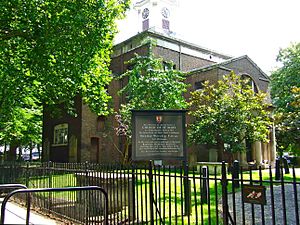
The current church was built in the Georgian style. Work started in 1788, and it was officially opened in 1791. The architect was John Plaw. He designed it with a Greek Cross shape. It was built using yellow London stock bricks and white stone. This church is one of only two buildings by Plaw still standing in the UK. The other is Belle Isle on Windermere. John Plaw later moved to Canada. There, he designed many public and private buildings.
The church was changed a bit in the 1800s. But in the early 1970s, architect Raymond Erith restored it. He made it look like it did in the mid-Georgian period. This restoration used money from building the Westway motorway next to the church. During the restoration, the chancel (the area around the altar) was put back to its original design. The main seating area (nave) got new box pews. The organ was also moved to the west end of the church. The organ case is a special memorial to Raymond Erith. Inside the church, you can find memorials to important local people. These include sculptor Joseph Nollekens and dictionary writer Peter Mark Roget.
St Mary’s Gardens: A Peaceful Park
The land next to the church used to be its churchyard. In the 1890s, it was turned into a public park. Today, it is known as St Mary's Gardens. It has green grass and many trees. The grave of the famous 18th-century actress Sarah Siddons is here. You can find it towards the northern part of the park. Some old gravestones from the churchyard are stacked against the park's west wall.
In 1968, the southern part of the churchyard was removed. This was to make space for the Marylebone Flyover. The graves that were there were moved. They were reburied in an area of Mill Hill Cemetery. A special plaque marks this reburial site.
Famous People Buried Here
Many notable people are buried in or near St Mary on Paddington Green.
In the Remaining Churchyard
- Rev Dawson Burns (1828–1909), a leader in the temperance movement.
- William Chandless (1829–1896), an explorer of the Amazon.
- Rev Alexander Geddes (1737–1802), a scholar who studied the Bible.
- Arthur Roberts (1852–1933), a well-known comedian.
- Basil Owen Woodd (1760–1831), a writer of hymns.
- Leonard Charles Wyon (1826–1891), an engraver and coin designer.
- Sir Stephen Spender (1909–1995), a famous poet.
- John Julius Norwich (1929–2018), a historian, writer, and TV personality.
In St Mary's Gardens
- Thomas Banks (1735–1805), a sculptor.
- Thomas Blore (1754–1818), a historian.
- William Collins RA (1788–1847), an artist.
- Matthew Dubourg (1703–1767), a violinist.
- Benjamin Haydon, (1786–1846) a painter.
- Joseph Nollekens (1737–1823), a sculptor, and his father, Joseph Francis Nollekens, an artist.
- Emma Paterson (1846–1886), a feminist and union leader.
- Thomas Richmond (1771–1837), a painter of miniatures.
- Sarah Siddons (1755–1831), a celebrated actress.
- Charles Stedman (1753–1812), an army officer.
 | Kyle Baker |
 | Joseph Yoakum |
 | Laura Wheeler Waring |
 | Henry Ossawa Tanner |


